News and Announcements
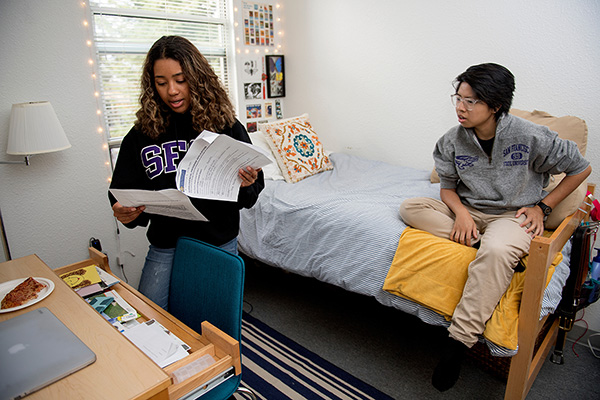
With a new residence hall scheduled to open in August, SF State will have an all-time high of 5,200 beds on campus this fall. The applications for on-campus housing for 2024 – 2025 open today.
The value of living on the SF State campus goes beyond the five-minute walk from bed to class, providing furnished rooms and shorter leases than the standard 12-month off-campus housing choices.
A new reduced-rate student housing program for first-time freshmen also launches this fall. The first program of its kind in the CSU system, it will provide reduced rates for 725 students in any of the four residential communities available to first-time freshmen who meet the qualifications to receive a Cal Grant A or B financial aid award.
“Living on campus is the best deal for SF State students without a doubt,” said Jeny V. Patiño, associate vice president for Housing, Dining and Conference Services. “It is a one-of-a-kind social experience for each student, helping them to foster personal growth, academic success and ultimately a faster path to graduation.”
Based on SF State institutional research, students who live on campus are more likely to take additional units each semester and have a four-year graduation rate that is 58% higher than students who live off campus. Additionally, first-year students who live on campus achieve a grade-point average 10% higher than those who live off campus.
“Folks are motivated with school. Everybody’s main goal is to get through school,” said Josue Mendez, a Kinesiology major who has lived in two of the residential communities at SF State. “We give each other lots of help to succeed. I’ve never gotten an unwelcome feeling here.”
Mendez, from Sacramento, says he met most of his friends through living on campus. When he isn’t playing basketball at the Mashouf Wellness Center (a free fitness club for students), he and his friends enjoy sharing music, food and trips on public transit to the Haight-Ashbury, downtown and other parts of San Francisco.
“You get a lot of community,” Mendez said. “Just roam the halls and people have their doors open playing music. I’ve been introduced to music I never thought I’d like. It’s just magical.”
New housing and more
The New Housing Community at West Campus Green is a 751-bed building rising six stories high and covering 120,000 square feet. Each floor averages 12 “pod-style” rooms, each housing three students. The pods also include a shared all-gender bathroom and study and lounge spaces.
The new community is accompanied by another new building that will house the Gator Health Center and a residential dining commons opening in early 2025. The project is supported by $116 million from California’s Affordable Student Housing Grant Program.
SF State’s residential communities
Altogether, SF State offers nine residential communities in three neighborhoods on campus.
- Mary Ward Hall and Mary Park Hall, which both opened in 1960, are traditional residence halls for freshmen. Rooms are double occupancy with common bathrooms, a community kitchen and lounge spaces.
- The Towers at Centennial Square is a 16-story high-rise with one- and two-bedroom suites for freshmen and sophomores. Rooms are double or triple occupancy with a private bathroom, kitchenette and a living and dining area.
- Towers Junior Suites is a five-story building with partial suites. Rooms are double occupancy and include a private bathroom.
- The Village at Centennial Square, which opened in 2001, features two- and three-bedroom apartments for transfer and international students. Rooms are single or double occupancy with a private bathroom, full kitchen and a living and dining area.
- Manzanita Square, built in 2020, is a mixed community for sophomores, juniors, seniors, graduate and transfer students interested in living year-round. This community offers apartment-style living: private bathrooms, full kitchen, and a living and dining area, with single and double occupancy available. The eight-story building also features lounge and study spaces, a gym and a community courtyard.
- University Park North was built in the 1950s as the Stonestown Apartments before being purchased by SF State in 2005. It is a mixed community for sophomores, juniors, seniors and graduate students. It has apartments of one, two and three bedrooms. Rooms are single or double occupancy with private bathroom(s), a full kitchen and a living and dining area.
- University Park South, enmeshed with the Parkmerced apartment community next door to campus, is for sophomores, juniors and seniors. It has apartments of one, two and three bedrooms. Rooms are single or double occupancy with private bathroom, a full kitchen and a living and dining area.
Students will move into their new campus residences at SF State in mid-August. They can apply early for on-campus housing, as spaces are filled on a first-come, first-serve basis.
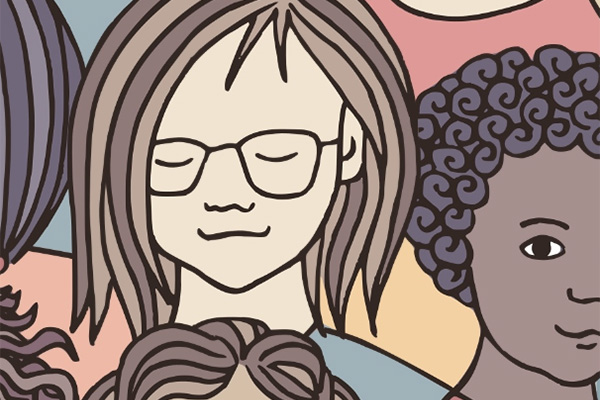
Associate Professor of Computer Science Anagha Kulkarni has been awarded a $357,003 research grant from Smith-Kettlewell Eye Research Institute (SKERl) to support an interdisciplinary clinical translational project in pediatric ophthalmology.
In collaboration with Dr. Arvind Chandna at SKERl, the project, titled “Computational Solutions for the Study of Higher Visual Function Deficits,” will focus on designing computational systems that first, enable the study of Cerebral Visual Impairment (CVI), a brain-based visual impairment and then translate the research findings into clinical practice through computational tools. The project period is September 2023 – August 2028.
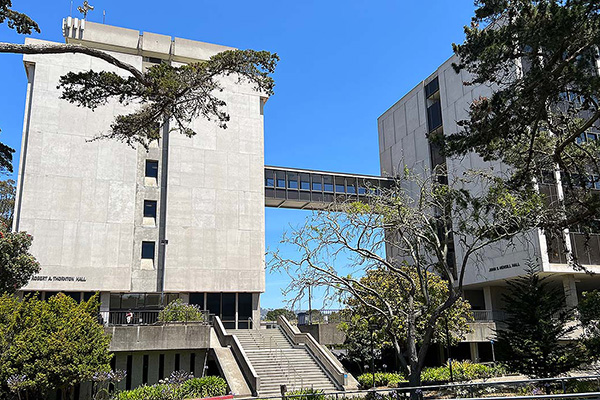
Science is constantly striving to break barriers and challenge old ideas. So it’s apropos that one of the main science buildings on the SF State campus, Thornton Hall, is named for an individual who broke barriers as a science educator.
The nine-story building was named after physicist Robert Ambrose Thornton (1897 – 1982), the first dean of SF State’s School of Natural Science in 1964 and the first Black faculty member to become a dean of science at the University. The building was built in 1972 and renamed after Thornton in 1981 at President Paul F. Romberg’s request. From his childhood to his work with Albert Einstein, Thornton was a force for science and education.
“All my life I’ve tried to give students a broad approach to science,” an 81-year-old Thornton told Joseph Torchia. “I’ve tried to prepare my students not only to become effective workers in industry, where they would use physics, but also to become effective and creative citizens in a democratic society, where they would use the totality of their knowledge.”
Thornton joined SF State in 1956 as a Physics professor with an expertise in theoretical mechanics and astrodynamics. In 1963, he was the first Black faculty appointed chairman of the Division of Natural Sciences. He became dean of the School of Natural Science (later School of Science) the following year and held the position until he retired in 1969.
SF State was only one of the schools impacted by Thornton’s indelible influence. A physicist, educator and administrator, Thornton had a 65-year-long career that included stints at several colleges and universities, including three historically Black universities (Shaw University, Johnson C. Smith University and Talladega College), Kittrell College, University of Puerto Rico, University of Chicago, Brandeis University, Dillard University and Fisk University. Even after retiring, he continued teaching at the University of San Francisco.
As for his own formal education, Thornton earned a B.S. in Mathematics and Physics from Howard University in 1922, an M.S. from Ohio State University and a Ph.D. in 1946 from the University of Minnesota. During this time, he had already begun teaching and earning his reputation as an educator … and Albert Einstein’s pen pal.
In 1944, Thornton joined the University of Puerto Rico to establish a liberal arts curriculum in the engineering school. Aiming to create a program that incorporated the philosophical side of science, he reached out to respected scientists to gain support for his approach. One hopeful letter to Einstein led to a nine-year correspondence and several in-person visits.
Born in Houston, Texas, Thornton developed his thirst for knowledge at a young age. His mother worked as a midwife in affluent white homes, and Thornton would often accompany her to work. The experience allotted him opportunities to roam clients’ libraries and absorb new knowledge and ideas.
Thornton considered pursing the arts. He was a bass singer who was offered an audition for the musical “Shuffle Along,” a Broadway hit that inspired new interest in Black musicals and theatre. Though he ultimately pursued a career in science and education, Thornton saw creativity in the sciences.
“Many people do not realize that scientists use the same type of imagination, intuition, idealization, and value judgements that the poet does,” Thornton told Pat Pierard in a 1967 interview.
Learn more about the College of Science & Engineering and the new Science & Engineering Innovation Center, SF State’s first new science building in nearly 50 years.
Special thanks to University Archivist Meredith Eliassen for her assistance with this article.
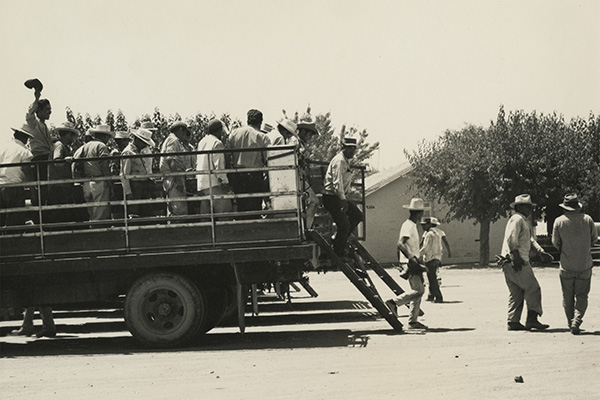
When SF State’s Labor Archives and Research Center (LARC) held its annual program on Feb. 29, it wasn’t just a celebration of the 38th anniversary of the event series’ launch. It also marked the culmination of a two-year, labor-intensive effort to digitize the life’s work of one of California’s most notable labor researchers.
The event also served as the official opening of a new exhibition, “Fields of Struggle: Agricultural Laborers in California, 1939 – 1966.” The exhibition showcases material from the Henry P. Anderson Papers, a collection of audio interviews, film footage, photographs, periodicals and more documenting the experiences of California agricultural workers. Anderson was studying for a master’s in Public Health at the University of California, Berkeley, in the mid-1950s when he began collecting the material as part of a thesis project on Mexican agricultural workers. Anderson became convinced that the program that allowed the workers to come temporarily to the U.S., known as the Bracero Program, was riddled with abuses, and he used his research to advocate for change. He remained active for years afterward as a labor activist and historian.
Consisting of 1,460 items, the Henry P. Anderson Papers was catalogued and digitized under the direction of SF State Digital Archivist Leah Sylva. Now it’s not just the backbone of the “Fields of Struggle” exhibition. It will be available online to researchers anywhere, anytime.
“Now researchers worldwide can access the correspondence, photographs and interviews remotely without needing to travel to campus,” Sylva said. “Also the selection process curates a sampling of material, presenting objects with high research value without the considerable labor usually required to hunt through archival cartons for relevant items.”
Anderson passed away in 2016. He had supported LARC with charitable donations and had conversations with staff members about leaving the center his papers. Two years ago, the Anderson Family Trust brought that to fruition with a generous grant covering the cost of organizing and digitizing the papers. The papers were donated by the family and processed in 2019 – 2020 by Archival Processing Team Lead Eva Martinez.
“It is tremendously gratifying, rewarding and moving, for myself and my family, to know that my father’s work now is memorialized in digital form and lives on as a resource for labor researchers and historians,” said Dori Anderson Rodriguez, Anderson’s daughter. “My father’s labor research materials, which included recorded interviews, photographs and writings, was to him his most valuable and important legacy. It brings us great pride and gratification to know that his research is now preserved and can be used now and in the future.”
“Fields of Struggle: Agricultural Laborers in California, 1939 – 1966” will be open for class visits throughout 2024. Anyone interested in scheduling a visit should email Sylva.
Photo courtesy of the Labor Archives and Research Center
SF State’s Office of Sustainability has unveiled the University’s revised Climate Action Plan on its website. Created through a collaboration of more than a dozen departments across campus, the new plan is presented in seven sections: How We Commute, How We Power, How We Build, How We Operate, How We Collaborate, How We Invest and How We Learn. Each section provides in-depth information on the University’s climate objectives, plans and progress.
“These are goals for the entire University and cover a wide range of goals that all students and employees of SF State will have to come together to achieve,” said SF State Climate Action Coordinator Taylor Mogavero.
Experience the magic of SF State’s 123rd Commencement ceremony on Friday, May 24, at Oracle Park, home of the San Francisco Giants. Please consider signing up as an ambassador — an integral role in the success of this monumental day. Ambassador assignments will be from 1:30 to 9:30 p.m.
As in years past, all ambassadors are asked to:
- Receive approval from their supervisor.
- Attend at least one informational training via Zoom for their assignment. The training dates are Monday, May 20, 1:30 – 2:30 p.m., and Monday, May 21, 10:30 – 11:30 a.m.
Many assignments involve large amounts of walking and standing. Please request any accommodations on the signup form under “Questions or requests.” Your support will help make this a special event for our graduating students, their friends and family members.
For questions, please email Dania Russell.
Starting March 4, SF State’s Parking and Transportation Services provides four brand-new Electric Vehicle (EV) charging stations in Lot 2. It includes three standard stations and one accessible station, to accommodate individuals with disabilities. This initiative aims to provide the campus and housing communities with a convenient and eco-friendly option for transportation, contributing to collective sustainability efforts.
The discounted EV charging rate for SF State faculty, staff and students is $1 per hour with no hourly limitations and no penalty. A valid SFSU parking permit remains mandatory for all users. Parking permit holders in lots 1, 6 and 19 are allowed to park while charging at the EV stations. To receive discounted pricing, create a ChargePoint account and use connection access code GatorEVs.
The rate for cars without a valid SFSU parking permit is $1.50 per hour, with a $6.25 session fee, which covers one day of parking permit, with no hourly limitations and no penalty.
For more information, visit the Parking and Transportation Services website.
For questions or assistance, please email Parking and Transportation Services.
The Division of Campus Safety is pleased to welcome its new police captain, Robert Yick. He officially assumes his duties on March 4.
Capt. Yick has over 31 years of commitment to public service. With six years of distinguished leadership at the command level, Capt. Yick is a seasoned law enforcement professional and a fifth-generation San Franciscan, the city he calls home.
Commencing his career in 1992 with the University of California Police Department, Berkeley, Capt. Yick transitioned to the San Francisco Police Department in 1994. His journey culminated with his retirement as the acting commander of the Metro Division, having held pivotal roles such as commanding Taraval Station twice and overseeing Central Station and Staff Services.
Capt. Yick’s expansive expertise spans various domains, including leadership, professional development, resource management, public safety, community relations, critical incident response, crowd management, event planning and emergency mitigation. Renowned for his balanced approach to policing and public service, Capt. Yick eagerly anticipates collaborating with SF State students, faculty and staff, leveraging his vast experience to bolster safety and foster community engagement.
In his leisure time, Capt. Yick finds solace in golfing, cycling, immersing himself in the arts and indulging in Netflix and Paramount Plus shows.
On Feb. 28, the Honorable Sergio Strozzi, the Italian consul general of San Francisco, visited SF State for an interview with KSFS student radio hosts Jenna Venuti, Samantha Ferro, Alex Lopez and Briana Keys.
The students’ KSFS show, “Crave,” is made up of diverse talents who come together to share their passions, including Italian American culture, lifestyles, mental health, the 49ers and much more. It airs live on Wednesdays, 10.30 a.m. – 11.45 a.m.
KSFS is housed in the Broadcast and Electronic Communication Arts Department in Marcus Hall.
In an asynchronous course from Academic Technology (AT), instructors will scaffold, reinforce and reimagine Canvas courses to streamline and organize content in dynamic ways. AT’s Teaching and Learning with Technologies and Services teams constructed this course as a blueprint for elevating instructors’ Canvas courses from a starter home to a dream home by providing insights, resources and peer discussion opportunities on course redesign.
The SF State Academic Senate will meet Tuesday, March 5, 2 – 5 p.m., at Seven Hills and via Zoom for its ninth meeting of the academic year. Please email the Senate office for a Zoom link.
Agenda:
- Recommendation from the Academic Policies Committee: Revision to S14-236 Academic Program Review Policy, in second reading.
- Recommendation from the Academic Policies Committee: Revision to S23-257 Course Syllabus Policy, in first reading.
- Recommendation from the Faculty Affairs Committee: Revision to F22-214 Retention, Tenure and Promotion Policy, in second reading.
- Recommendation from the Faculty Affairs Committee: Revision to S20-145 Department Chairs and Equivalent Unit Directors Policy, in first reading.
- Recommendation from the Student Affairs Committee: Anti-Doxxing Resolution, in second reading.
- Recommendation from the Student Affairs Committee: Resolution in Appreciation of Exceptional Efforts by the Enrollment Management During the Rollout of the Revised FAFSA (Free Application for Federal Student Aid), in first reading.
- Recommendation from the Educational Policies Committee: Revision to S22-255 Requirements for Baccalaureate Degrees, Majors, Concentrations, Minors, and Certificates, in first reading.
- Recommendations from the Campus Curriculum Committee: program change requests, in second reading:
- B.A., Liberal Studies ITEP (Integrated teacher Preparation) reduce units
- Recommendation from the Campus Curriculum Committee in first reading:
- Minor, Health Education (name change)
- Minor, Empowerment for Self Defense (revised)
- B.S. Interior Design and Architecture (library info added)
- Minor, Special Education (reduce number of units, technically substantive)
- Minor, Finance (rescind the suspension that never actually took place and update courses)
- Minor, Global World Music and Dance (name change, resituate program and update courses)
- B.A., Ethnic Studies (move from College of Professional and Global Education to state support and other issues)
- B.S., Asian American Studies, Distance Education Authorization
- B.A., Race and Resistance Studies, Distance Education Authorization
- B.A., Latina/Latino Studies, Distance Education Authorization
- B.A., American Indian Studies, Distance Education Authorization
- The Academic Senate will hear formal presentations from:
- Gretchen Le Buhn, professor of Biology, chair of University Research, Scholarship and Creative Activities (URSCA): “URSCA Council Presentation”
- Guisselle Nuñez, associate vice president, Strategic Marketing and Communications: “Marketing the Value of an SF State Education”
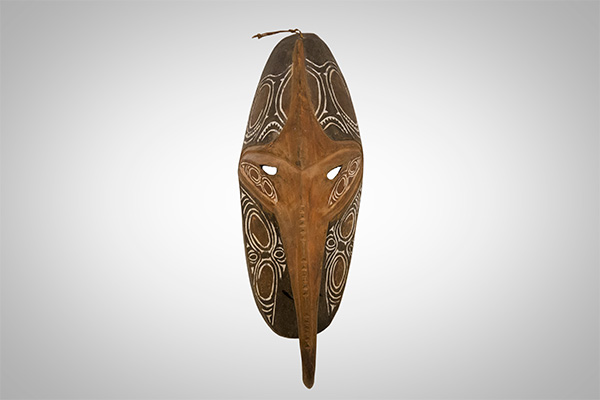
Join the SF State Museum Studies program and the Sutro Library for a special collaborative spring exhibit, “The Land of the Unexpected: A Journey to the South Pacific,” featuring rare books from the Sutro Library’s collections in conversation with objects from collections stewarded by the Global Museum on behalf of SF State. It is on display through Tuesday, April 30, in the Sutro Library (J. Paul Leonard Library, fifth floor). It is open Tuesdays – Thursdays, 10 a.m. to 4 p.m.
Developed and curated by Museum Studies graduate student Emma de Graaf, “The Land of the Unexpected” invites visitors to explore the vibrant culture and diverse ecosystems of Papua New Guinea and the South Seas, an often-misunderstood region. Experience its natural beauty, its rich cultural heritage and the resilience of its people. Discover the stories that have shaped its identity.
Photo courtesy of the Global Museum
SF State has partnered with other CSU campuses to provide workshops for employees.
The CSU Cross-Campus Collaboration provides a unique opportunity to extend campus workshops beyond campus borders and a different way to share professional development systemwide.
Workshops:
- Gender Identity and Pronoun Use
- Breath and Health (Multiple dates)
- Atomic Habits: Becoming the Architect of Your Life
- Weekly Dose of Mindfulness (Multiple dates)
- How to be an Effective Virtual Team Member
- Negotiation by Any Other Name
- Facilitating Challenging Conversations Series (Multiple dates)
- Self-Coaching 101 (Multiple dates)
- How to Get Your Child to College
- Exposing Hidden Bias (Multiple dates)
- Using Inclusive Language
- The Performance Diagnostic Checklist: A simple tool to boost your team’s success
- Generational Diversity
- Streamlining Communication: Beyond the Inbox
- Diversity, Inclusion and Equity 101
- Decisions, Decisions! Creative Problem Solving and Decision-Making Techniques
- Virtual Stepping Beyond – Customer Service
- Impact of Learning Styles in the Workplace
- S.M.A.R.T. Goals
- Excel Tips and Tricks
- Getting Started with Microsoft OneNote
- Success as First-Gen Professional (Multiple dates)
- Subject Matter Experts and Course Design
- Building Trust in the Workplace
Go to the Chancellor’s Office CSU Cross-Campus Collaboration website to register.
Please drop in to connect with peers and learn how to cultivate and repair past and current work relationships. Promoting Equity & Relationships among Colleagues (PERC) fellows will facilitate a restorative circle on Wednesday, March 6, noon – 1 p.m., in Library 240.
An RSVP is preferred, but not required. Please RSVP via email to CEETL.
History Associate Professor Maziar Behrooz and International Relations Professor Mahmood Monshipouri will lead a teach-in and discussion, “What’s at Stake in the Israel-Hamas War,” on Wednesday, March 6, at 4:30 p.m. via Zoom.
Behrooz and Monshipouri will offer their long-term research investments in their disciplines and in the study of the region. They will also analyze implications for regional concerns, international and human rights law and the humanitarian crisis that continues to unfold.
This event is sponsored by the SF State Center for Iranian Diaspora Studies; SF State’s departments of International Relations, History, Political Science and program in Middle East and Islamic Studies; and the UC Berkeley Center for Middle East Studies.
Join the Muslim Student Association and the General Union of Palestinian Students for an Islamophobia seminar on Friday, March 8, 2 – 5 p.m., in Jack Adams Hall, Cesar Chavez Student Center.
The event will be an engaging dialogue on how the war in Gaza has increased instances of Islamophobia across the world, but especially in the U.S. Speakers will highlight their advocacy work and breakdown the array of stereotypes and misconceptions around Islam that lead to Islamophobia. This is also an opportunity to educate the campus community on available resources that can be leveraged for combating Islamophobia-related hate crimes.
The Academic Technology Advisory Committee presents an online panel discussion with students about generative artificial intelligence (AI) on Wednesday, March 13, noon – 1 p.m.
They will discuss how they use and experiment with generative AI, their perspectives on this new and emerging technology, and their thoughts about how it can play a role in their learning.
Generative AI is a hot topic in higher education, both for its potential to impact teaching and learning but also for its disruption of disciplines and the workforce.
Risk and Safety Services hosts its first open house forum on safety topics. It takes place Thursday, March 14, 10 – 11 a.m., in Library 121.
Are you considering enrolling your child in a summer program? SF State offers diverse and inclusive summer programs with a mission to provide a safe and high-quality experience that engages campers with recreation, field trips and other interactive learning activities.
For questions or topic suggestions, please email Risk and Safety Services.
Herbert Zettl, distinguished professor emeritus of Broadcast and Electronic Communication Arts, died Oct. 30 at his home in Forest Knolls. He was 94.
Zettl taught for over 40 years and mentored countless individuals who continue to serve as professors and entertainment industry professionals.
He is best known for his work in media aesthetics and television production. Zettl reached thousands of students and media professionals as author of “Sight Sound Motion: Applied Media Aesthetics” and a series of television production textbooks including, “Television Production Handbook,” “Television Production Workbook,” “Video Basics” and “Video Basics Workbook.”
A short memorial will be held Thursday, March 14, at noon in Marcus Hall 224.
SF State’s School of Public Affairs and Civic Engagement and Career & Leadership Development Office present “Innovative Ways to Serve Aging Populations: Careers in Aging panel discussion” on Thursday, March 14, 2 – 3:30 p.m., in Library 121.
Professionals who work on age-friendly city initiatives, caregiving and housing for seniors and more will speak about their work and discuss emerging career opportunities in the field. Light refreshments will be served.
Speakers:
- Luke R. Barnesmoore, Home Match, Front Porch Community Services
- Karen Grimsich, City of Fremont Aging and Family Services
- Jill Melvin, clinical care manager lead, Sage Eldercare Solutions
- Kari Rogenski, director of The Hummingbird Project, Sage Eldercare Solutions
- Erin Tordsen, director of home care supervision, Sage Eldercare Solutions
Get ready to move: The 11th Annual 5K Walk, Run and Roll will take place on Saturday, April 13, at 9 a.m.
Entry before Friday, March 15, is $10 for students, $15 for faculty, staff and alumni and $20 general.
The event is inclusive and open to all participants. It features giveaways and awards to celebrate the winners and participants. The event is divided in brackets for each: walk, run and roll.
For accommodation requests, please email Inclusive Rec at least two weeks in advance.
SF State Spotlight
The San Francisco Foundation has announced a new scholarship program for SF State students who identify as Black, and who demonstrate financial need. The San Francisco Foundation Black Excellence Scholarship for SF State will offer $2,500 scholarships to 35 SF State students each year.
“SF State students are a vibrant part of the Bay Area community,” said Fred Blackwell, CEO of the San Francisco Foundation. “By creating this scholarship program, we are helping to ensure that all SF State students have a fair chance to complete their studies and contribute their talents to an inclusive, thriving Bay Area.”
Since 1948, the San Francisco Foundation has dedicated itself to advancing social justice in the Bay Area by partnering with donors, nonprofits and community leaders to create a region where everyone thrives. The foundation is thrilled to support students at SF State, one of the pillar universities in the Bay Area and the first in the nation to establish a college dedicated to ethnic studies.
Of all racial groups in the Bay Area, Black residents have the highest percent of completing some college education, but not obtaining a bachelor’s degree, according to the Bay Area Equity Atlas, which is supported by the San Francisco Foundation. Recent data also show that the six-year graduation rate among Black students at SF State is 48%. This new scholarship aims to not only boost enrollment for Black students but also increase graduation rates among this group.
“One of the biggest barriers to earning a degree is the total cost of attending college. With the Bay Area’s high cost of living, we can see why these scholarships will help our students tremendously,” Senior Associate Vice President for Enrollment Management Katie Lynch said. “We are grateful that the San Francisco Foundation has created this program that’ll help close long-standing equity gaps in higher education.”
The Feb. 19 announcement underlines the San Francisco Foundation’s ongoing commitment to racial equity and economic inclusion in education. In 2018, it created a scholarship program for Black students at UC Berkeley, as part of the university’s African American Initiative. Now in its sixth year, the scholarships have supported more than 100 students to date, ensuring that they have equitable access to an education at UC Berkeley.
The San Francisco Foundation encourages donors to join in contributing to the San Francisco Foundation Black Excellence Scholarship for SF State and UC Berkeley’s African American Initiative Scholarship to help Black students thrive at both universities. To support these scholarship programs, visit the San Francisco Foundation giving page or email Donor Services.
The San Francisco Foundation Black Excellence Scholarship for SF State application, selection and awards process is managed by Scholarship America, a nonprofit organization that specializes in scholarship administration. The application process opens on Monday, March 11, and applications are due on April 10. Recipients will be announced in May, and scholarship awards will be issued in the fall. For more information, please email San Francisco Foundation scholarships.
Jeff Jacoby, professor of Broadcast and Electronic Communication Arts, has completed two new audio programs in “The Traveling Radio Show Goes to the CSU!” series. Programs at CSU Monterey Bay and CSU Sacramento are available on Soundcloud.
“It was a joy to work with the students at these two campuses; these kids are scrappy, motivated, smart and remarkably kind,” Jacoby said. “Two more episodes to come later this spring, including our very own SF State. Stay tuned!”
“The Traveling Radio Show” tells stories about places and people. It’s an immersive, engaging “you-are-there” experience: sound-rich, fun-loving and a bit silly, too.
Two faculty members and a graduate student were among the presenters at the California Higher Education Basic Needs Alliance 2024 Summit, held Feb. 21 – 22 in Sacramento.
Zubaida Qamar, associate professor of Nutrition and Dietetics, presented on “Nourishing Campus Communities: Data-Driven Strategies for Sustainable Food Security Interventions.” Her talk focused on her work of enhancing food security in higher education through innovative strategies for data collection from the campus food pantry and improving food literacy around commonly available food items.
Gretchen L. George, associate professor of Nutrition and Dietetics, presented with her graduate student and dietetic intern, Dana Alvarez Mendoza. They led an interactive workshop around food insecurity and personal appearance distress based on the 2021 National College Health Assessment survey findings, with the goal of increasing awareness around potential relationships between food access cycles, disordered eating patterns and overall health.
Biology Lecturer Ivy Chen spoke on Feb. 29 at an online film screening of “My Body to Love: Katie’s Story.” Parent Venture presented the event.